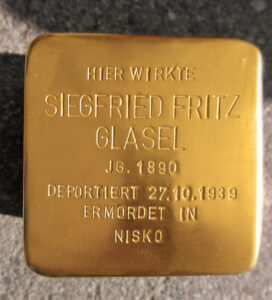Siegfried GLASEL was born in Vienna on May 28, 1890. He was the only child of the Jewish couple Josef and Auguste GLASEL, née Kürschner. Josef was a warehouse manager.
Auguste died when Siegfried was five years old and is buried in the Jewish section of the Vienna Central Cemetery.
Siegfried GLASEL grew up to become an actor with the stage name »Fritz« GLASEL and performed on the provincial stages of the Austrian-Hungarian Monarchy – for example he performed at the city theater of Brüx (now Most in the Czech Republic) during the 1913/14 season.
For several years he was a member of the ensemble of the theater director Paul Blasel and his wife, the once well known singer and actress Leopoldine Korner,1 at the city theaters of Pressburg (now Bratislava in Slovakia) and Salzburg.
On August 17, 1917, »Fritz« GLASEL played the Lieutenant von Kallern in a performance of Franz von Schönthan’s popular military comedy Goldfish presented by the Salzburg Stadttheater in honor of the 30th birthday of »his majesty Kaiser Karl«.
The Stadttheater was known for its productions of operettas, farces, fairy tales, comedies, tragedies, and occasionally operas. »Fritz« GLASEL played mostly minor roles in Wiener Blut, Die Fledermaus, Der Feldherrnhügel, Das Dreimäderlhaus, Im weißen Rößl, Lumpazivagabundus, Der Verschwender, Die Räuber, Fuhrmann Henschel, Das weite Land, Peer Gynt and other works.
GLASEL played the doorman Rosenstock in Arthur Schnitzlers play Das weite Land which was part of the repertory of the Vienna Hofburgtheater (that was Hugo Thimig’s role when it premiered in Vienna).
After the collapse of the Austrian-Hungarian Monarchy »Fritz« GLASEL mainly lived in Salzburg with his woman companion, a divorced woman with five children, but now and then he lived as an unmarried actor in the Stadttheater at number 2 Makartplatz.
»Fritz« GLASEL was already marked as a Jew in Antisemitic Salzburg in the mid-1920s. His name appeared in the »Jew registry«, a list of Jews to be boycotted that was printed in every issue of the Iron Broom, a scurrilous newspaper produced by the Salzburg branch of the Austrian United Antisemitic League – an alliance of German nationalist, Catholic and Nazi Antisemites that had been formed in 1919.
It isn’t certain why GLASEL had to give up his acting career, but according to his official registration he continued to be active as a choral singer in Salzburg.
We do know, however, that a law introduced by the Nazi regime in 1933 prohibiting taking more than 1,000 German Marks out of the country caused a sharp drop in attendance at the Stadttheater and this probably led to reductions in personnel there.
After the annexation of Austria by Nazi Germany the Stadttheater was renamed the Salzburg Landestheater, its current name.
It is certain in any case that an unemployed Siegfried GLASEL was registered in Vienna’s 6th district at 25 Mollardgasse from August 2, 1938 to October 27, 1939 – with a notation upon his departure »to Poland«. Because of a clerical error in entering his name in the Shoah Data Bank of Yad Vashem his fate was long unknown.2
It is now clear that the 49 year old Siegfried GLASEL was among the 672 Jews who were shipped out of Vienna on October 27, 1939 in the second transport sent to Nisko in occupied Poland – where Adolf Eichmann intended to establish a »Jewish Reservation«.3
The actor »Fritz« GLASEL, who played the doorman Rosenstock in Arthur Schnitzler’s Das weite Land in the Salzburg Stadttheater, was one of Eichmann’s victims.
The fate of his father is clearly documented: the 81 year old widower Josef GLASEL was deported from Vienna to the Theresienstadt concentration camp on June 28, 1942 and was murdered there on October 2, 1942.
1 Paul Blasel was born in Linz on June 29, 1855. He debuted as a young lover in Bad Ischl and Salzburg, acted on numerous stages and was a singer and director, with some interruptions he was a director at the Salzburg Stadttheater from 1899 to 1932 and was finally the theater manager before he retired from there with an honorary pension, he died in Salzburg on June 21. 1940.
His first wife Leopoldine Korner was born in Vienna on August 10, 1858 – she sang soprano and acted on numerous stages and died in Vienna on June 8, 1926.
2 He was entered in the Shoah Databank as Siegfried Blasel instead of Glasel
3 Jonny Moser, Nisko. Die ersten Judendeportationen (Vienna 2012)
Sources
- Israelitische Kultusgemeinde [Jewish Community] Vienna, City and State Archive of Vienna, Salzburg Museum, and City Archive of Salzburg
Translation: Stan Nadel
Stumbling Stone
Laid 18.04.2013 at Salzburg, Makartplatz 2




